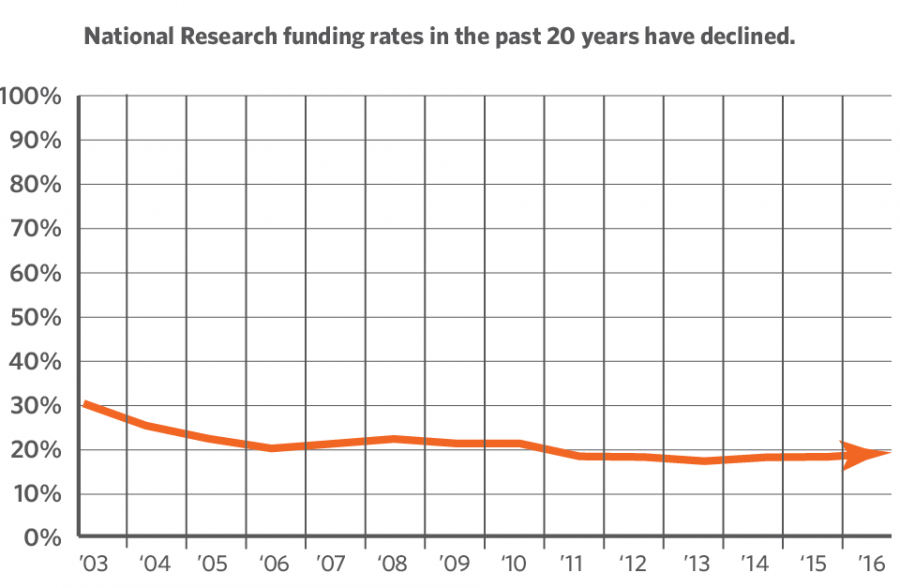Decrease in federal funding creates challenges for researchers
Source: NIH Report
October 26, 2017
Lack of federal funding at Midwest universities for basic research has declined since 2008, according to an article by The Atlantic titled “The Decline of the Midwest’s Public Universities Threatens to Wreck Its Most Vibrant Economies.”
According to the article, declines in funding create more pronounced problems at public universities than private universities, especially in the Midwest.
The endowments of the universities of Iowa, Illinois, Ohio State and Wisconsin total about $11 billion, and the schools enroll nearly 190,000 students among them. Meanwhile, Stanford, Harvard and MIT hold about $73 billion while only enrolling about 50,000 students.
Melissa Edwards, director of research communications at the University, wrote in an email that in the 2015 Fiscal Year, the University’s total research and development expenditures were $640 million. Within that, federally funded research and development expenditures totaled $338 million.
“The University research enterprise is vibrant and growing, and we are committed to creating opportunities for our faculty,” Edwards said. “To do that, we must be able to attract and support the highest-quality students, faculty and staff, and limited funding can erode our ability to do so.”
Get The Daily Illini in your inbox!
John Katzenellenbogen, research professor of Chemistry at the University, said decreases in funding have made it harder for him conduct research to the extent that he wishes.
“It’s made it much more challenging to get the funding I think we could utilize well. It just means we have to spend much more time in writing proposals,” Katzenellenbogen said. “It’s also constrained the extent to which I can collaborate with people who have complementary interests and expertise. By working together we could really make things go faster.”
Renske M. van der Veen, assistant professor of chemistry, said some programs have even been postponed, and as a result there is no notice of any new proposals for those at the moment.
She has been working on her research through startup funds thus far, which she first received when she became an assistant professor in 2015.
Van der Veen said that as of now, her research group is not affected too deeply by decreases in federal funding, but that she is worried about how that might change in two years once her startup funds run out.
“I am very worried. I just keep trying, and my strategy is to submit as many proposals as I can. I think there will be a smaller chance of getting proposals (in the future),” van der Veen said.
Katzenellenbogen said the success rates of getting funding for some institutes is as little as 8 percent.
This decline is noteworthy even before taking into account current proposals to cut the National Science Foundation and National Institutes of Health budgets by billions of dollars extra, according to the article by The Atlantic.
Paul Kenis, professor of chemical and biomolecular engineering, described federal funding as falling flat.
He said the bigger problem is that in most of the science and engineering disciplines, the number of faculty has gone up. Departments have grown, so more people are trying to go after the same money.
Kenis also said a lot of departments are now receiving funding from corporations instead of the federal government.
“Corporations see and realize that with their own budget cuts, they can only do certain types of research that they can do at much cheaper costs if they partner with universities,” Kenis said. “My own lab used to be 80 to 90 percent funded by federal funds, and now it’s the opposite. It’s mostly by companies.”
Kenis said in the future he expects to see heavy investments, particularly in energy research, as corporations will continue to support endeavors there.
Similarly, Katzenellenbogen said he believes the future state of the country relies heavily on scientific research.
“I think recognition (of) advances in research are really what are the bedrock of this country’s future in terms of not only health of the nation, but economic vitality and even national security,” Katzenellenbogen said.
Katzenellenbogen also said the future of scientific research itself relies on politics.
“I think if political forces really come to recognize (the importance of research), I think the support could go up and be more commensurate with what could be provided by the scientific enterprise of this country,” Katzenellenbogen said. “It doesn’t seem like it’s in the horizon at the moment, but I certainly hope it comes soon.”







